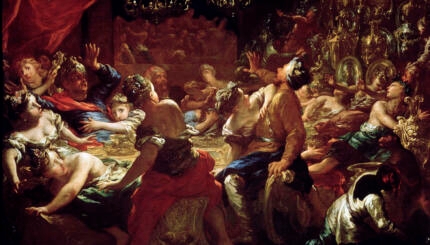Death is a problem. It is death that seems to suck the meaning out of life. If it is all temporary, if after 60 or 80 or even 120 years it is all gone, then what’s the point? If all of life is leading inexorably towards a time at which it disappears like a puff of smoke, then my existence is just an exercise in futility, and I might as well never have lived to begin with.
This is the profoundly pessimistic premise that suffuses that Book of Ecclesiastes, which we read during synagogue services on the of Sukkot.
Note: Ecclesiastes, known in Hebrew as Kohelet, is in the Writings (Ketuvim) section of the Bible. It is traditionally attributed to King Solomon, an authorship questioned by most biblical scholars, and is read during the week of Sukkot. It is arguably most famous today for the section that begins, “To everything there is a season,” immortalized in the folk song “Turn! Turn! Turn! (To Everything There is a Season)“.
Read the entire text of Ecclesiastes in English and Hebrew on Sefaria.

Help us keep Jewish knowledge accessible to millions of people around the world.
Your donation to My Jewish Learning fuels endless journeys of Jewish discovery. With your help, My Jewish Learning can continue to provide nonstop opportunities for learning, connection and growth.
The book struggles with the meaning of life in light of death. Again and again it repeats the refrain “Vanity, vanity, all is vanity,” as it catalogues our efforts to provide our lives with a sense of meaning by building monuments that will outlast us. A small number of us endeavor to amass wisdom that will be passed on and will live beyond our deaths. Many more of us amass material goods in great quantity, hoping somehow to create a permanence that will outlive our limited time on earth. We toil and we construct and we hoard. Sometimes we perhaps do not even consciously understand that it all arises from a vain desire to overcome the inevitable temporality of life. We carry within us a deep sense of humiliation in the face of death. It is degrading to live and then be gone forever and ever, and so we have an existential need to make a mark that will last.
But it won’t. And even if it will, you will be gone, so what does it matter? All the fame and glory of accomplishment, whether material or intellectual accomplishment, will not solve the problem. All the books and theorems that we have authored, all the buildings and treasuries that may live on after death, can never plug that black hole in our souls created by awareness of our own mortality. As I read it, that is the intention of the chord ‘Vanity, vanity, all is vanity,’ to which the author of Ecclesiastes returns again and again.
But King Solomon, to whom the book of Ecclesiastes is traditionally attributed, is not uniformly pessimistic. He sees a way out of the abyss, although he manages to extricate himself only partially, occasionally succumbing to the melancholy with which he began. The solution is to embrace the temporality of life, and without looking beyond, to savor the moment. One must focus on the here and now. Indeed, there is no permanence; our existence is transitory by its very nature. That however, is not man’s downfall. His downfall is rather precisely in the vain effort to deny the truth that cannot be denied.
One must find the intrinsic value of the present. Wisdom is indeed meaningful, if it is gathered for its own sake and not as a monument to him who gathered it. Appreciated and savored in the here and now, wisdom is one of God’s greatest gifts to man. So too for wealth. If you understand that wealth is only in order to be enjoyed today, if you completely abandon the thought of wealth as fame for tomorrow, then you may be on your way to overcoming one of the greatest pitfalls of life.
The Bible is full of revelation and history, commandment and advice, teachings and direction. Not too many biblical books contain philosophical struggles. Not too many usher us into the inner chambers of the author’s dialectical wrestlings with the deepest universal issues of life. Ecclesiastes is one of them. How fitting it is for the High Holiday season. There is no better occasion than this time of ultimate accounting and introspection, to look death in the eye, even to blink and to struggle and to teeter on the edge of the abyss of meaningless, and to come out of this struggle with a renewed dedication to the sanctity and beauty of every single moment that God has given us on earth.



